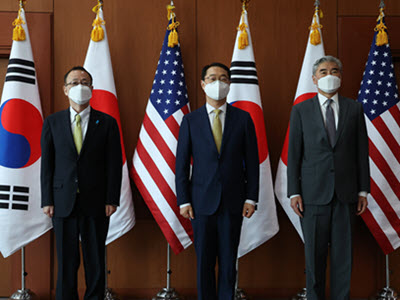U.S.-Japan-ROK Trilateral Cooperation
Strengthening Regional Security
This commentary by Heino Klinck is part of the roundtable “The Future of Trilateralism under the Biden-Yoon-Kishida Administrations.”
The United States, the Republic of Korea (ROK), and Japan share a long list of common democratic values and security interests. However, the full potential of trilateral cooperation has yet to be realized. In fact, the last several years were particularly challenging during President Moon Jae-in’s administration as the ROK’s bilateral relationships with both the United States and Japan deteriorated for a variety of mainly political reasons.
ROK-Japanese relations are fraught with the historical legacy of colonialism and World War II. Arguably, Japanese contrition has not mirrored that of postwar Germany with regard to war crimes and atrocities, at least not from the perspective of many Asian countries invaded and subjugated by imperial Japan. This unfortunate vestige of history is particularly profound in South Korea due to the exceptionally sensitive issue of the so-called “comfort women.” This and other bilateral disputes, including territorial disputes revolving around the Liancourt Rocks (known as Dokdo in South Korea and Takeshima in Japan), have manifested themselves in a downward spiral of diplomatic, economic, judicial, and political scuffles.
With the election of President Yoon Suk-yeol, there is cause for optimism that relations between Seoul and Tokyo will improve and thus also offer opportunities for trilateral collaboration with Washington. Since his inauguration in May, there have been several bilateral and trilateral meetings at the head-of-government and cabinet levels. Arguably, the exigent nature of security concerns is driving this much-needed rapprochement.
North Korea presents all three allies with an imminent threat of a renewed provocation cycle that could include a nuclear test. China is a long-term strategic threat, pressuring like-minded democracies in all domains to acquiesce to a new world order governed by the interests of the Chinese Communist Party while threatening to invade Taiwan. Russia has encroached on the air space and waters of both Japan and South Korea with air and naval incursions alongside China’s People’s Liberation Army (PLA) on multiple occasions. These geopolitical realities incentivize Seoul and Tokyo to manage their differences in order to deepen trilateral military cooperation with Washington to mitigate against these common threats.
In the defense and security arena, the following steps should be taken, among others, to increase trilateral military cooperation:
- Resume and enhance missile warning and tracking exercises.
- Practice relevant information sharing.
- Conduct exercises focused on air and sea interdiction, anti-submarine warfare, mining, and maritime domain awareness.
- Build an exercise regime that develops bilateral exercises into trilateral opportunities to enhance interoperability; and when that is not feasible, regularly exchange observers to bilateral exercises.
- Conduct regular leader exchanges between the ROK-U.S. Combined Forces Command and U.S. Forces Japan focused on the supporting role of Japan in a Korean Peninsula scenario.
At the political-military level, both Japan and South Korea have had concerns about the United States’ extended nuclear deterrence. While the U.S. commitment is very real, it must be repeatedly reaffirmed. Given a possible (perhaps even probable) North Korean nuclear test, Russia’s nuclear saber-rattling vis-à-vis NATO, and the PLA’s growing nuclear triad, it would be appropriate to augment bilateral U.S. dialogues on extended deterrence with an initial trilateral meeting to discuss common threats, assessments, and policies.
The clear, present, and growing Chinese threat to a democratic Taiwan is also a threat to the interests of the United States, Japan, and the ROK. This point is now routinely highlighted in senior leader joint statements. While Chinese sensitivity to any apparent enhancement of unofficial relations with Taiwan is well-known, no- or low-profile actions in support of legitimate security interests are urgently needed. Deterring Chinese aggression against Taiwan as well as planning for possible Taiwan contingencies is clearly in Japan’s and South Korea’s interests.
With U.S. leadership and support, these actions should be considered:
- All three countries should engage in trilateral discussions regarding possible Taiwan contingences, leading to a tabletop exercise to examine coordinated responses as well as the potential impact on and roles of U.S. Forces Korea and U.S. Forces Japan.
- Japan and South Korea should exchange unofficial military attaché equivalents with Taiwan.
- The coast guards of Japan, South Korea, the United States, and Taiwan should operate and exercise together, focusing on law-enforcement activities and climate change mitigation, particularly in the waters of Pacific Island countries with which they all have diplomatic relations.
- Given the strategic value of the semiconductor industry, opportunities for a “semiconductor chip Quad” consisting of the United States, Taiwan, South Korea, and Japan should be explored.
There are also actions that the legislatures of all three countries should take to enhance trilateral cooperation. The U.S. Congress, ROK National Assembly, and Japanese Diet should facilitate people-to-people exchanges by supporting initiatives that focus on common values and interests while bridging the painful history of the last century. The strengths of the Korean-American and Japanese-American communities should be harnessed to the same ends, and the respective congressional caucuses could lead these efforts.
There is strong bipartisan support in the United States for enhancing ROK-Japan ties. An objective of the Trump administration’s U.S. Strategic Framework for the Indo-Pacific was “drawing South Korea and Japan closer to one another.” The Biden administration’s Indo-Pacific Strategy likewise “encourage[s] our allies and partners to strengthen their ties with one another, particularly Japan and the Republic of Korea.” Both documents should be heeded, and the United States should enhance and expand trilateral cooperation to defend shared values and interests against a myriad of common threats.
Heino Klinck is a member of the Board of Advisors at the National Bureau of Asian Research and the Founder and Principal of Klinck Global LLC. Most recently, he was the deputy assistant secretary of defense for East Asia. In that role, he devised and implemented U.S. defense policy in a portfolio of over twenty countries and territories, advancing national security interests through defense strategy development, bilateral alliance management, security cooperation, contingency planning, and program oversight.



